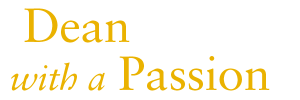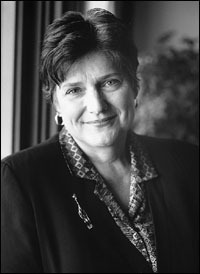
Marla Salmon
brings to
Emory ideals
from the '60s,
a work ethic
from her
parents,
and a passion
for nursing
that is all
her
own.
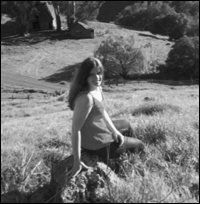
"I was a
leftist,
feminist, radical, war-protesting
hippie," she once
told a reporter
about her
college days.
"It was great."
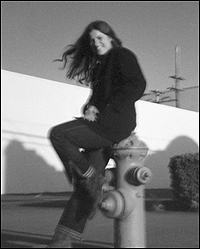
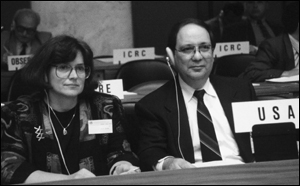
Dean Marla Salmon, the current chair of the
World Health Organization's Global Advisory Group
on Nursing and Midwifery, served as a member of the
US Delegation at the 48th World Health Assembly in
Geneva in May 1995, following in the steps of Nell
Hodgson Woodruff (right) who also served earlier as
a US representative to WHO.
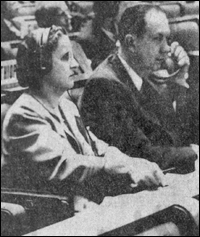
She feels an important message
to convey to nursing students
is that the very
existence of nursing
"is derived from its
social contract
to do good for
society and its
members."

Dr. Salmon, shown here with President Bill
Clinton, is no stranger to Washington. She served
on First Lady Hillary Rodham Clinton's Health Care
Task Force as well as being director of the
Division of Nursing for the US Department of Health
and Human Services from 1991 to 1997.
|
 n the 1960s, about 5,000 people called
Sebastopol, California, home. Most of them were
farmers who worked the fertile Northern California
fruit orchards. Of those, many were migrant farm
hands from far-flung places like Brazil, Japan, and
Mexico. They worked alongside Native Americans and
the descendants of German Lutherans, who had moved
into the area in the mid-19th century. Even by 1960
standards, Sebastopol was a tiny place. Still, it
had a large enough Asian community to support a
Buddhist temple, and it was idyllic enough to
attract its own commune, Morning Star, which
brought an antiestablishment contingency of hippies
(and their children) into the mix. And then there
were the Salmons. Everett Salmon, raised in South
Dakota, joined the Civilian Conservation Corps as a
teenager and eventually became a doctor with the
assistance of the GI Bill. In 1945, he married a
Missouri-born nurse named Marceline Adamson, who
had served in the Cadet Nurse Corps and who became
a partner in Everett's general practice. Both grew
up without much money in the midst of the
Depression, and they knew what it was like to work
hard. They passed along those hard-working values
to their four children: a journalist, two opera
singers, and one nurse, their daughter Marla. That
daughter grew to become the nation's chief nurse,
directing the Division of Nursing for the US
Department of Health and Human Services (DHHS) from
1991 to 1997. She has served on the faculty of
several universities, including Johns Hopkins,
Michigan, North Carolina, and Pennsylvania. This
past summer, Marla Salmon, ScD, RN, FAAN, received
her newest nursing assignment when she accepted the
position of dean of the Nell Hodgson Woodruff
School of Nursing. Through each of her tenures,
Salmon (pronounced "SOL-mon") has carried
her parents' sense of responsibility for the good
health of neighbors and community. Her father
believed in treating all patients fairly, and he
took care of migrant workers despite their lack of
health insurance or ability to pay. Her mother was
a role model, too, bringing to nursing a strong
belief in caring and courage. In writing about her
own nursing values recently, Salmon recounted an
experience her mother had as a student nurse.
Although Marceline Adamson had been taught not to
question doctors' orders, she did so one day during
her training when she knew that a dosage ordered by
a physician would be fatal if administered.
"She knew that this act of disobedience could
put a quick end to her not-yet-begun career,"
Salmon wrote about her mother. "Nevertheless,
the compelling values of courage and truly caring
for the well-being of her patient prevented my
mother from acting in her own self-interest."
The story made an impression on Marceline's
daughter. n the 1960s, about 5,000 people called
Sebastopol, California, home. Most of them were
farmers who worked the fertile Northern California
fruit orchards. Of those, many were migrant farm
hands from far-flung places like Brazil, Japan, and
Mexico. They worked alongside Native Americans and
the descendants of German Lutherans, who had moved
into the area in the mid-19th century. Even by 1960
standards, Sebastopol was a tiny place. Still, it
had a large enough Asian community to support a
Buddhist temple, and it was idyllic enough to
attract its own commune, Morning Star, which
brought an antiestablishment contingency of hippies
(and their children) into the mix. And then there
were the Salmons. Everett Salmon, raised in South
Dakota, joined the Civilian Conservation Corps as a
teenager and eventually became a doctor with the
assistance of the GI Bill. In 1945, he married a
Missouri-born nurse named Marceline Adamson, who
had served in the Cadet Nurse Corps and who became
a partner in Everett's general practice. Both grew
up without much money in the midst of the
Depression, and they knew what it was like to work
hard. They passed along those hard-working values
to their four children: a journalist, two opera
singers, and one nurse, their daughter Marla. That
daughter grew to become the nation's chief nurse,
directing the Division of Nursing for the US
Department of Health and Human Services (DHHS) from
1991 to 1997. She has served on the faculty of
several universities, including Johns Hopkins,
Michigan, North Carolina, and Pennsylvania. This
past summer, Marla Salmon, ScD, RN, FAAN, received
her newest nursing assignment when she accepted the
position of dean of the Nell Hodgson Woodruff
School of Nursing. Through each of her tenures,
Salmon (pronounced "SOL-mon") has carried
her parents' sense of responsibility for the good
health of neighbors and community. Her father
believed in treating all patients fairly, and he
took care of migrant workers despite their lack of
health insurance or ability to pay. Her mother was
a role model, too, bringing to nursing a strong
belief in caring and courage. In writing about her
own nursing values recently, Salmon recounted an
experience her mother had as a student nurse.
Although Marceline Adamson had been taught not to
question doctors' orders, she did so one day during
her training when she knew that a dosage ordered by
a physician would be fatal if administered.
"She knew that this act of disobedience could
put a quick end to her not-yet-begun career,"
Salmon wrote about her mother. "Nevertheless,
the compelling values of courage and truly caring
for the well-being of her patient prevented my
mother from acting in her own self-interest."
The story made an impression on Marceline's
daughter.

 hese years later, after
Salmon has firmly established herself as an
energetic nursing leader with an international
reputation, it is hard to imagine what she
describes as her undistinguished high school
career. However, she soon made up for lost academic
time at the University of Portland. An
undergraduate in the days when women at the
Catholic university were not permitted to wear
jeans or slacks to university functions, she
protested with signs that read if priests could
wear dresses, women should be able to wear pants.
"I was a leftist, feminist, radical,
non-Catholic, war-protesting hippie," she once
told a reporter of those days. "It was
great." She was also a diligent student,
earning good marks that led to a BA in political
science in 1971 and a BS in nursing in 1972. With
those degrees, Salmon was just getting started in
bringing her 1960s values to the world. At the
completion of her nursing program, she traveled as
a Fulbright Scholar to the University of Cologne,
where she studied Germany's national health
insurance and public health system. She brought
those experiences back to the United States, where
she began to tailor a career focusing on health
disparities, public health policy, and health care
ethics. She earned a doctorate with a concentration
in health policy and administration from Johns
Hopkins School of Hygiene and Public Health in
1977. She directed the patient advocacy program at
Hopkins Hospital and later became its director of
nursing and associate director of emergency
medicine. She next held leadership positions at the
University of Minnesota and the University of North
Carolina. Her research has focused on nursing
workforce issues, health care reform implications
for nursing, health care policy, and public health
and community nursing. During the mid-1980s, she
was a W.K. Kellogg fellow and a fellow at the
Hubert H. Humphrey Institute of Public Affairs. She
has been no stranger to the role of principal
investigator on national studies that examine
public health nursing needs, community-based
nursing curriculum, and other nursing workforce
topics. She has taken her research findings on the
road, presenting papers throughout the United
States and Europe. Salmon's accomplishments
received national recognition when she was
appointed as the DHHS head nurse. Next came her
position as professor and associate dean for
graduate studies at the University of Pennsylvania,
a six-year chairmanship of the National Advisory
Council on Nurse Education and Practice, and
membership in the US Delegation at the 48th World
Health Assembly. She is the current chair of the
World Health Organization's Global Advisory Group
on Nursing and Midwifery. At each stage of her
career, Salmon has brought a passion for nursing
and public health to the wider world. In a sense,
she's still articulating the values of hard work,
equal access to health care, and the courage to do
the right thing that she learned from her parents.
Those values are consistent with her "hippie
days" when she supported individuals' rights
and political freedom. These days she's helping the
Emory health sciences community define and
articulate its own values, values that will
ultimately help shape health care of the new
millennium. hese years later, after
Salmon has firmly established herself as an
energetic nursing leader with an international
reputation, it is hard to imagine what she
describes as her undistinguished high school
career. However, she soon made up for lost academic
time at the University of Portland. An
undergraduate in the days when women at the
Catholic university were not permitted to wear
jeans or slacks to university functions, she
protested with signs that read if priests could
wear dresses, women should be able to wear pants.
"I was a leftist, feminist, radical,
non-Catholic, war-protesting hippie," she once
told a reporter of those days. "It was
great." She was also a diligent student,
earning good marks that led to a BA in political
science in 1971 and a BS in nursing in 1972. With
those degrees, Salmon was just getting started in
bringing her 1960s values to the world. At the
completion of her nursing program, she traveled as
a Fulbright Scholar to the University of Cologne,
where she studied Germany's national health
insurance and public health system. She brought
those experiences back to the United States, where
she began to tailor a career focusing on health
disparities, public health policy, and health care
ethics. She earned a doctorate with a concentration
in health policy and administration from Johns
Hopkins School of Hygiene and Public Health in
1977. She directed the patient advocacy program at
Hopkins Hospital and later became its director of
nursing and associate director of emergency
medicine. She next held leadership positions at the
University of Minnesota and the University of North
Carolina. Her research has focused on nursing
workforce issues, health care reform implications
for nursing, health care policy, and public health
and community nursing. During the mid-1980s, she
was a W.K. Kellogg fellow and a fellow at the
Hubert H. Humphrey Institute of Public Affairs. She
has been no stranger to the role of principal
investigator on national studies that examine
public health nursing needs, community-based
nursing curriculum, and other nursing workforce
topics. She has taken her research findings on the
road, presenting papers throughout the United
States and Europe. Salmon's accomplishments
received national recognition when she was
appointed as the DHHS head nurse. Next came her
position as professor and associate dean for
graduate studies at the University of Pennsylvania,
a six-year chairmanship of the National Advisory
Council on Nurse Education and Practice, and
membership in the US Delegation at the 48th World
Health Assembly. She is the current chair of the
World Health Organization's Global Advisory Group
on Nursing and Midwifery. At each stage of her
career, Salmon has brought a passion for nursing
and public health to the wider world. In a sense,
she's still articulating the values of hard work,
equal access to health care, and the courage to do
the right thing that she learned from her parents.
Those values are consistent with her "hippie
days" when she supported individuals' rights
and political freedom. These days she's helping the
Emory health sciences community define and
articulate its own values, values that will
ultimately help shape health care of the new
millennium.

 ust as Marceline Salmon inspired
her daughter with a devotion to nursing and
specifically to patients' rights, Marla Salmon is
strongly committed to passing on that inspiration
not only to her own daughter--who has chosen
nursing as a profession-but also to her nursing
students and faculty colleagues. Teaching and
scholarship have long been central to her work.
Among the lessons that Salmon wishes to impart to
students is the essential role of caring in their
profession. She warns against instruction that
simply offers one simulation after another.
"As we find more ways to teach that remove our
students from the people they serve, we must work
even harder to make sure that we don't overlook the
human connections that teach caring," she
wrote in a 1997 article in Nursing and Health Care
Perspectives. In addition to caring, the lessons
that Salmon emphasizes to nursing students are
courage, inclusion, reflective thinking, and social
responsibility. She wonders whether today's
students really understand that the US health care
system serves only some people, while more than 40
million others have no real access to care. She
wonders whether students are taking time to reflect
on the meaning of what they do. "We must
educate more than schooled practitioners," she
writes. And finally, she feels an important message
to convey to nursing students is that the very
existence of nursing "is derived from its
social contract to do good for society and its
members." ust as Marceline Salmon inspired
her daughter with a devotion to nursing and
specifically to patients' rights, Marla Salmon is
strongly committed to passing on that inspiration
not only to her own daughter--who has chosen
nursing as a profession-but also to her nursing
students and faculty colleagues. Teaching and
scholarship have long been central to her work.
Among the lessons that Salmon wishes to impart to
students is the essential role of caring in their
profession. She warns against instruction that
simply offers one simulation after another.
"As we find more ways to teach that remove our
students from the people they serve, we must work
even harder to make sure that we don't overlook the
human connections that teach caring," she
wrote in a 1997 article in Nursing and Health Care
Perspectives. In addition to caring, the lessons
that Salmon emphasizes to nursing students are
courage, inclusion, reflective thinking, and social
responsibility. She wonders whether today's
students really understand that the US health care
system serves only some people, while more than 40
million others have no real access to care. She
wonders whether students are taking time to reflect
on the meaning of what they do. "We must
educate more than schooled practitioners," she
writes. And finally, she feels an important message
to convey to nursing students is that the very
existence of nursing "is derived from its
social contract to do good for society and its
members."

 almon believes in signs. It
was only natural then, when Salmon contemplated a
move to Emory, that she look for signs. After all,
she was happy at Penn. "I kept trying to find
a reason why Emory wasn't a good fit," she
says, "and I decided that I needed to spend a
week here. I wanted to be in this environment and
see if it matched the values that the university
said it held." During that week, she talked
with administrators, faculty, students, and total
strangers. The message she received again and again
was that, at Emory, she would be able to pursue the
things she cared most about. She found Emory to
offer a simultaneously reflective and vibrant
environment with a nursing school that was
launching a new doctoral program and soon breaking
ground on a new building. She was excited about the
possibilities of collaboration with public health
faculty, with the university's commitment to
teaching and internationalization, and with the
health sciences' vision and strategic plans. In
particular, the broad-based endorsement of nursing
as a major academic unit of the Health Sciences
Center and the university were important to her
later decision to lead the school. Her
administration will emphasize teaching, research,
and service that directly impact patient care.
She'll judge research development by its promise
for improving the way in which nurses provide care.
She'll encourage classroom teaching that builds
nurse leaders who want to shape the future of the
profession. She'll support service that is relevant
to the community and that develops community
partners with the school. Salmon predicts that the
school will need to maintain a fast pace to act on
some of the major health opportunities emerging at
Emory. She hopes that the nursing school will play
an important role in an initiative by Wesley Woods,
a geriatrics center, to foster optimal aging that
includes housing the elderly in community-oriented
facilities rather than more expensive institutions.
She wants to build on collaborations with the
schools of Medicine and Public Health and
neighboring institutions such as the Centers for
Disease Control and Prevention. She hopes the
School of Nursing can bring its expertise to the
Winship Cancer Institute as the center reaches for
a new level of distinction. "There's a natural
energy right now throughout the nursing
school," Salmon says. "The real challenge
is to try to frame changes in a way that has more
to do with shaping than engineering. The most
important thing that I can do is describe the
possibilities and enable those in the nursing
school to make them happen." Salmon herself is
no novice when it comes to making things happen.
Her youthful idealism is now seasoned with the
confidence and determination that experience can
lend. Again, at Emory, she is rolling up her
sleeves to enable great things to happen. There's
no reason, she says, why Emory's School of Nursing
can't be the best in the country. Parents Everett
and Marceline would be proud. almon believes in signs. It
was only natural then, when Salmon contemplated a
move to Emory, that she look for signs. After all,
she was happy at Penn. "I kept trying to find
a reason why Emory wasn't a good fit," she
says, "and I decided that I needed to spend a
week here. I wanted to be in this environment and
see if it matched the values that the university
said it held." During that week, she talked
with administrators, faculty, students, and total
strangers. The message she received again and again
was that, at Emory, she would be able to pursue the
things she cared most about. She found Emory to
offer a simultaneously reflective and vibrant
environment with a nursing school that was
launching a new doctoral program and soon breaking
ground on a new building. She was excited about the
possibilities of collaboration with public health
faculty, with the university's commitment to
teaching and internationalization, and with the
health sciences' vision and strategic plans. In
particular, the broad-based endorsement of nursing
as a major academic unit of the Health Sciences
Center and the university were important to her
later decision to lead the school. Her
administration will emphasize teaching, research,
and service that directly impact patient care.
She'll judge research development by its promise
for improving the way in which nurses provide care.
She'll encourage classroom teaching that builds
nurse leaders who want to shape the future of the
profession. She'll support service that is relevant
to the community and that develops community
partners with the school. Salmon predicts that the
school will need to maintain a fast pace to act on
some of the major health opportunities emerging at
Emory. She hopes that the nursing school will play
an important role in an initiative by Wesley Woods,
a geriatrics center, to foster optimal aging that
includes housing the elderly in community-oriented
facilities rather than more expensive institutions.
She wants to build on collaborations with the
schools of Medicine and Public Health and
neighboring institutions such as the Centers for
Disease Control and Prevention. She hopes the
School of Nursing can bring its expertise to the
Winship Cancer Institute as the center reaches for
a new level of distinction. "There's a natural
energy right now throughout the nursing
school," Salmon says. "The real challenge
is to try to frame changes in a way that has more
to do with shaping than engineering. The most
important thing that I can do is describe the
possibilities and enable those in the nursing
school to make them happen." Salmon herself is
no novice when it comes to making things happen.
Her youthful idealism is now seasoned with the
confidence and determination that experience can
lend. Again, at Emory, she is rolling up her
sleeves to enable great things to happen. There's
no reason, she says, why Emory's School of Nursing
can't be the best in the country. Parents Everett
and Marceline would be proud.
|
